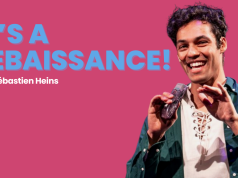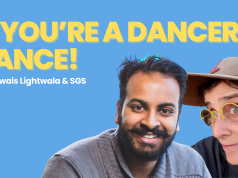Podcast: Play in new window | Download
Subscribe: RSS
Thought #1 by Adam Pottle. Here in Canada, whenever we talk about diversity, the conversation surrounding diversity is often restricted to race. Now while race is obviously an important part of diversity, it is not the only aspect of diversity. We often have to make sure that we include Deafness and disability, homosexuality transsexuality and bisexuality as well. Diversity means everyone.
Thought number 2: For wanting to love fully and completely one must be able to empathize, to open oneself up to many different kinds of people. Otherwise, one risks that love becoming a kind of shelter or a shield for one’s prejudices, and it taints that love.
Thought Number 3. Deafness and disability are often thought of as novelties, as gimmicks and unfortunately are often treated as such in the theatre, film and on television. But Deafness and disability are multifarious subjects as complex as love, death, war, anger and any other subject that you can think of. Artist need to treat Deafness and disability that way. We need to realize the artistic possibilities.
Thought number 4
“ADAM!”
“Yessss?”
“We advertised you as a deaf writer, you prick! Why did you take the deaf off the sign!”
“Because, you twat, a writer is a writer is a writer”
“But we need the full marketing and shit!”
Stifle your labels you malodorous beast! When you label me you put me in a pen. My work is for everyone”
Thought number 5: Just because a piece of art is politically progressive doesn’t mean that it’s good. A politically charged play must balance aesthetics with politics. It must tell the story honestly, not didactically. If one wants to be merely political one can hand out pamphlets or write manifestos instead of plays
Thought number 6: It is imperative that deaf, hard of hearing and disabled actors be given the chance to represent themselves on stage on film and on television. I understand that is is an attractive artistic challenge for a hearing and able bodied actor to play such roles and that studios and producers want well-known actors to fill such roles. But, at the same time, if you are a director striving for authenticity, well how much more authentic can you get than having someone who is actually deaf, or hard of hearing or disabled?
Thought number 7. As I become more involved in the theatre I have noticed that there is little overlap between the literary community and the theatre community. I seldom see poets and novelists attend plays and I don’t often see playwrights at book launches or public readings. I find this situation strange. Have these artists become ensconced in echo chambers that reflect their own values back at them? Do they simply want more of what they are familiar with? Or do they want new work as long as it is within their chosen medium?
Thought number 8. We are only beginning to realize the potential of using sign language on stage. Its animated nature and robust expressiveness lends itself naturally to the theatre. IT is perhaps the best language for expressing profound emotions whether its anger, love, frustration, jealousy or outrage. We simply need to see more of it.
Thought number 9. Just because one is Deaf or disabled doesn’t mean that one can’t be sexy. Now when I say sexy I don’t mean freaky or kinky or exotic, I mean attractive. If you carry yourself with strength and confidence, you are sexy. And after the act of lovemaking, you can look into each other’s eyes and enjoy the connections you’ve made over the physical, intellectual, spiritual or emotional. Sex is almost a form of art in that it gives you a glimpse into another person’s world, and the Deaf and the disabled are part of that.
Thought number 10. The key source of difficulty for Deaf and disabled people is the way normalcy is conceived. Currently, normalcy is restrictive and encourages exclusion and discrimination. But if we can reconceive normalcy as open and fluid, rather than restrictive, then everyone becomes a part of normalcy, everyone is welcome. Now while such a re-conception may be difficult, it is not impossible. We can certainly do better than we are doing now.
Thought number 11. the world is a noisy place. Silence comes at a premium. Silence can often be quite discomforting for many people. The world is so noisy that people are often suspicious of silence. Silence is often understood to be the calm before the storm. But silence can be active it’s not necessarily synonymous with peace or menace or suspense. So much happens in a quiet room. The world moves but we don’t hear it. Sometimes the things we want to hear the most can’t be shaped into sound
Thought number 12. After watching Nyle DiMarco win dancing with the stars. One thought filled my head: If we use our imaginations we can communicate anything to anyone. Through the language of dance, DiMarco communicated to the world the beauty of Deaf experience. We live in a world where there are so many resources available to us. If we are not communicating we are being either ignorant or lazy
Final Thought. The theatre could be an enormously influential vehicle for positive progressive change. For me it all starts with good story telling. Begin with a good story and work your way outward. If you can smack people on the heart, if you can make their guts churn, if you can make them make them erupt with laughter, if you can make then collapse into tears, if you can open them up, and show them a new world, then you can provoke them into positive action.









